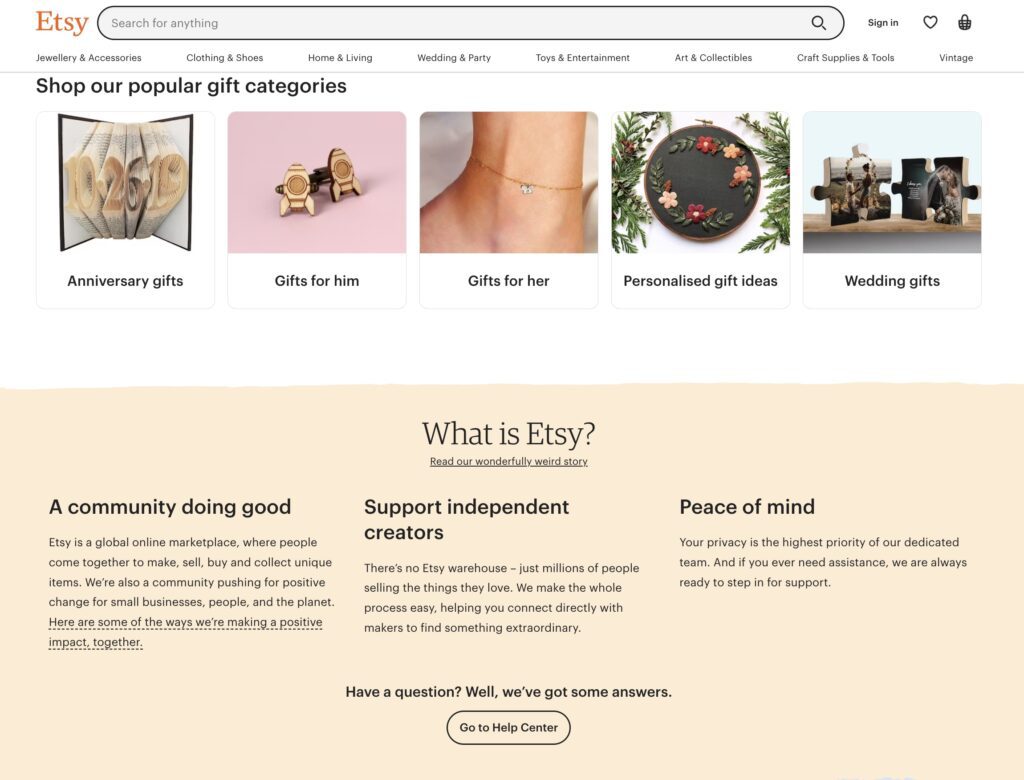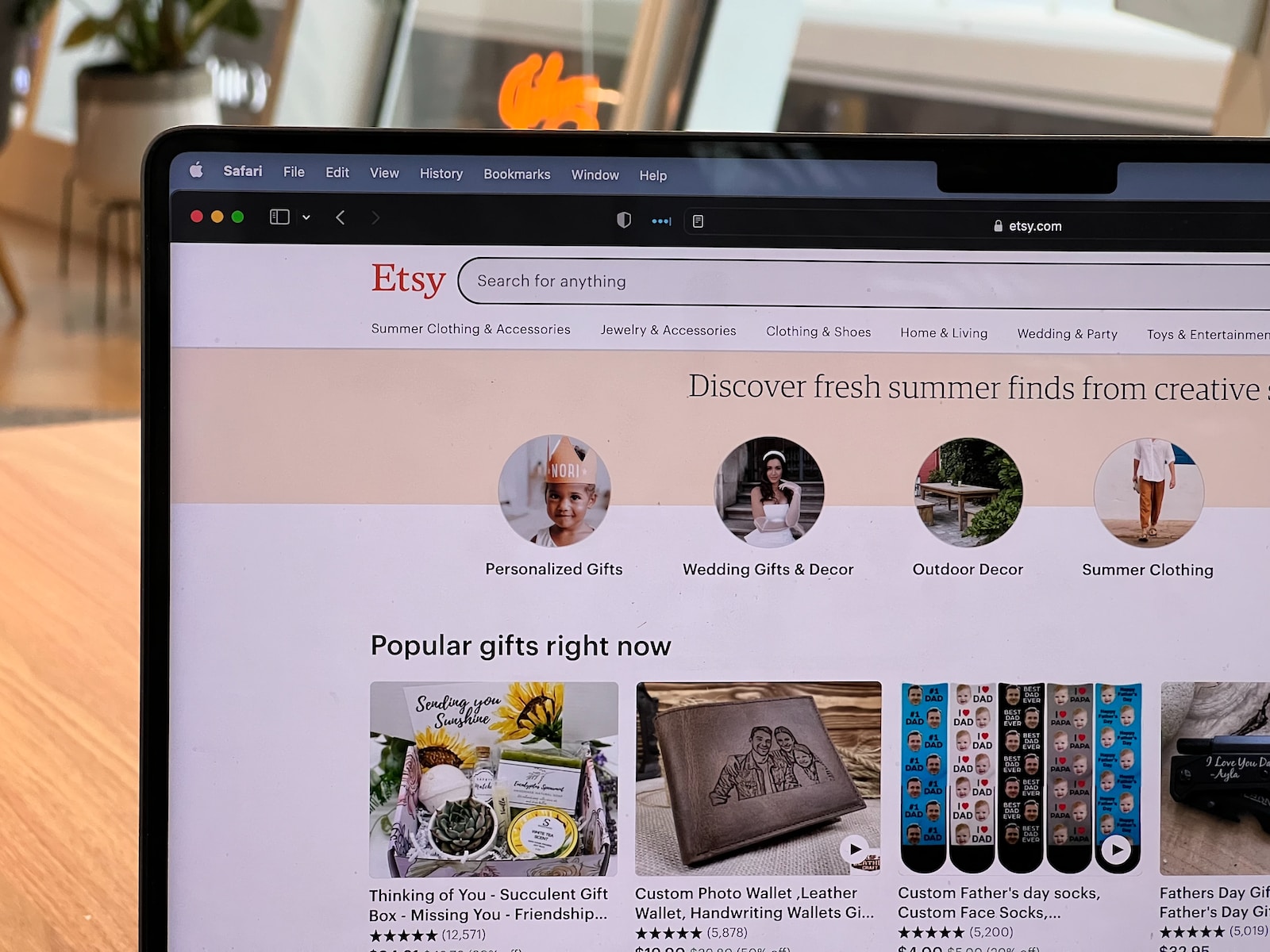Are you considering selling your products online but unsure whether you should choose Shopify vs Etsy? The two popular e-commerce platforms have their own unique features and advantages, making it difficult to choose between them.
In this article, we’ll take a closer look at both platforms and help you decide which one is the best fit for your business.
Key Takeaways
- Shopify is a platform that allows merchants to create their own online stores, while Etsy is a marketplace where sellers can list their handmade or vintage items.
- Shopify offers more extensive control over your online store’s branding and design, while Etsy offers more limited customization options.
- Etsy has a larger audience, with over 95.1 million buyers as of 2023, making it a great option for reaching a wide audience.
- Shopify offers more extensive shipping and fulfillment options, while Etsy’s options are more limited.
- Shopify’s pricing plans range from $29 to $299 per month, while Etsy charges a listing fee of $0.20 per item and a commission fee of 5% on each sale.
- When choosing between the two, consider your business type, goals, budget, and branding to make an informed decision.
Shopify Overview
Shopify is a platform that allows merchants to create their own online stores. It offers a range of features, including customizable templates, payment processing, and inventory management. With Shopify, you have complete control over your online store and can create a unique brand.
Shopify is a popular e-commerce platform that allows businesses to create and run their own online stores. It offers a range of features, including customizable templates, secure payment processing, and inventory management, making it easy for businesses to build and manage their online presence.
- Customizable templates
- Secure payment processing
- Inventory management
- Analytics capabilities
- User-friendly interface
- Extensive knowledge base and community of users for support and learning best practices
One of the biggest advantages of Shopify is its search engine optimization and social media marketing capabilities. This means that your store can be found by potential customers who are searching for products like yours. However, Shopify comes at a cost. There are different pricing plans ranging from $29 to $299 per month, depending on the features and level of support needed. This can be a significant investment for small businesses.
Further Read:
👉 Shopify Review (2023): The Pros And Cons Of Selling With Shopify
👉 Shopify Pricing, Plans And Fees Explained (2023)
Etsy Overview
Etsy, on the other hand, is a marketplace where sellers can list their handmade or vintage items. It has a strong focus on handmade goods and vintage items, and sellers must adhere to certain guidelines. With Etsy, you can reach a large audience without the hassle of creating your own website.

Etsy charges a listing fee of $0.20 per item, and a commission fee of 5% on each sale. This can be a more affordable option for small businesses just starting out. However, selling on Etsy means you are subject to their rules and regulations. You may not have complete control over your store’s branding, and your products may be competing with similar items from other sellers.
Shopify vs Etsy: What to Consider
When it comes to choosing between Shopify and Etsy, there are several factors to consider. Here are some of the key differences between the two platforms:
| Feature | Shopify | Etsy |
|---|---|---|
| Audience Size | Smaller | Larger |
| Control Over Branding and Store Design | Extensive | Limited |
| Customizability | More extensive | Less extensive |
| Payment and Transaction Fees | Charges transaction fees for using third-party payment gateways | Does not charge transaction fees for using third-party payment gateways |
| Marketplace Fees | Charges a monthly fee based on the features and level of support needed | Charges a listing fee of $0.20 per item |
| Shipping and Fulfillment | More extensive options | Less extensive options |
| Integrations and Apps | Wider range of options | More limited options |
| Customer Support | More extensive options | Less extensive options |
Audience Size, Traffic and Visibility
Shopify allows merchants to reach a wider audience through search engine optimization and social media marketing. However, Etsy’s larger audience may result in more visibility for your products.
Etsy has a larger audience, with over 95.1 million buyers as of 2023. This means that your products may be seen by more people on Etsy than on Shopify.
In fact, Etsy has become a go-to destination for buyers looking for unique, handmade, or vintage items. By selling your products on Etsy, you’ll have access to a large and diverse pool of customers who are specifically looking for the types of products you offer.
Additionally, Etsy’s community-driven platform encourages buyers to engage with sellers, providing opportunities for you to build a loyal customer base and receive valuable feedback on your products.
Overall, selling on Etsy can help you reach a wider audience and connect with customers who are passionate about the products you create.
On the other hand, Shopify offers a range of tools to help merchants reach a wider audience. With features like search engine optimization and social media marketing capabilities, your online store can be found by potential customers who are searching for products like yours. Additionally, Shopify has integrations with various marketplaces and shopping channels, such as Amazon, eBay, and Facebook, to help you reach more customers.
Control Over Branding and Store Design
Shopify is a powerful platform that offers extensive control over your online store’s branding and design, enabling you to create a unique look and feel that reflects your brand’s personality and values. With Shopify, you have access to a wide range of customizable templates and themes, allowing you to tailor your store’s appearance to your specific needs and preferences.
On the other hand, while Etsy is a great platform for selling handmade and vintage items, it may not provide you with as much control over the look and feel of your store. This is because Etsy has a more standardized layout and design, which may limit your ability to create a distinctive and memorable online presence.
Customizability
Customizability is an important factor to consider when choosing an e-commerce platform for your online store. Both Shopify and Etsy offer options for sellers to tailor their online stores to their specific needs and preferences.
However, Shopify’s templates and design options are more extensive than what is offered on Etsy. This means that Shopify merchants have greater control over the look and feel of their online stores, enabling them to create a unique brand and online presence that reflects their personality and values.
With Shopify, merchants can choose from a wide range of customizable templates and themes, allowing them to create a store that is tailored to their specific products and target audience. This level of customization not only helps merchants stand out from the competition, but also enhances the overall shopping experience for their customers.
Etsy offers some level of customization for sellers to tailor their online stores to their specific needs and preferences. The platform provides a range of options for sellers to add their own branding, such as shop banners and logos, as well as the ability to create custom listings and product descriptions. Sellers can also choose from various templates to create a consistent look and feel for their store. However, compared to Shopify, the customization options on Etsy are more limited, which may impact a seller’s ability to create a truly distinctive and memorable online presence.
Payment and Transaction Fees
While Shopify charges transaction fees for using third-party payment gateways, Etsy does not. However, it is worth noting that Etsy does charge a commission fee on each sale, which may be a significant factor to consider depending on your business needs.
Etsy charges a commission fee of 5% on each sale in addition to a listing fee of $0.20 per item. It’s worth noting that while Etsy doesn’t charge transaction fees for using third-party payment gateways, the commission fee on each sale can add up depending on your business needs. For example, if you sell an item for $100 on Etsy, you’ll be charged a commission fee of $5 in addition to the listing fee of $0.20. Therefore, it’s important to consider these fees when deciding whether or not to sell on Etsy.
Shopify charges transaction fees for using third-party payment gateways. The fee varies depending on the pricing plan, but it ranges from 0.5% to 2% per transaction.
Marketplace Fees
Etsy charges a listing fee of $0.20 per item, which means that each time you list a new product, you’ll be charged $0.20. Etsy does not charge a monthly fee.
Shopify, on the other hand, charges a monthly fee based on the features and level of support needed. The pricing plans range from $29 to $299 per month.
The Basic Shopify plan costs $29 per month and includes features such as unlimited products, 24/7 support, and a website and blog. The Shopify plan costs $79 per month and includes additional features such as gift cards and professional reports. The Advanced Shopify plan costs $299 per month and includes even more advanced features such as advanced report builder and third-party calculated shipping rates.
Shipping and Fulfillment
Both platforms offer various shipping and fulfillment options, but Shopify’s options are more extensive.
In fact, Shopify has a wide range of shipping and fulfillment options that can be customized to meet the needs of your business.
For example, you can choose from multiple carriers, shipping speeds, and packaging options to ensure that your products are delivered to your customers in a timely and professional manner.
Additionally, Shopify offers advanced inventory management features that allow you to keep track of your stock levels, set up automatic reorder points, and manage multiple warehouses. With these powerful tools at your disposal, you can streamline your shipping and fulfillment processes, reduce costs, and improve customer satisfaction.
Etsy offers various shipping and fulfillment options, but they are not as extensive as what is offered on Shopify.
With Etsy, sellers can set up shipping profiles, which allow them to specify the shipping costs and processing times for their products. Sellers can also purchase and print shipping labels directly from the Etsy platform.
Additionally, Etsy has a global shipping program that allows sellers to ship their products internationally more easily. However, compared to Shopify, Etsy’s shipping and fulfillment options are more limited.
Integrations and Apps
Shopify has a wide range of integrations and apps, which can greatly enhance the functionality of your online store.
With Shopify, you can integrate with various marketplaces and shopping channels, such as Amazon, eBay, and Facebook, to help you reach more customers. Additionally, Shopify has many third-party apps that can help you with tasks like email marketing, social media advertising, and inventory management.
On the other hand, Etsy’s options for integrations and apps are more limited. However, Etsy does offer some integrations with other platforms, such as Quickbooks and Squarespace, to help you streamline your business operations. Additionally, Etsy has a range of apps that can help you with tasks like shipping and fulfillment, marketing, and bookkeeping.
QuickBooks is a popular accounting software designed for small and medium-sized businesses that allows users to track income and expenses, create invoices, manage bills and payments, and generate financial reports. It also offers features such as inventory management, payroll processing, and tax preparation. It is widely used by businesses across various industries and is known for its reliability, accuracy, and ease of use.
- User-friendly interface
- Time-saving features such as automatic data entry, automatic bank feeds, and automatic invoicing
- Customizable reports
- Integration with other software
- Cloud-based access
- Multi-user access
- Automatic backups
When it comes to comparing the two, Shopify offers a wider range of integrations and third-party apps, which can provide greater flexibility and functionality for your online store. However, if you are primarily focused on selling handmade and vintage items, Etsy’s more limited options may still be sufficient for your needs.
Customer Support
Both Shopify and Etsy offer customer support, but Shopify’s support options are more extensive. Shopify offers 24/7 support via phone, email, and live chat, as well as a help center with a range of resources and articles. In addition, Shopify has a large community of users who can provide support and advice on various topics related to running an online store.
Etsy also offers customer support, but it may not be as extensive as what is offered on Shopify. Etsy has a help center with various articles and resources, as well as a community forum where sellers can ask questions and receive support from other sellers. However, Etsy’s support options may be more limited, which could be a disadvantage for some sellers.
Overall, Shopify’s customer support options may be more robust and comprehensive compared to Etsy’s. However, both platforms offer some level of support to help sellers with their online businesses.
Shopify vs Etsy: Which One Should You Choose?
When it comes to choosing between Shopify and Etsy, there are several factors to consider. Here are some things to keep in mind:
- Business Type: Shopify is better suited for businesses that want complete control over their online store’s branding and design. Etsy is better suited for sellers of handmade and vintage items.
- Goals: What are your goals for your online store? If you want to create a unique brand, Shopify may be the better option. If you want to reach a large audience quickly, Etsy may be the better option.
- Budget: Shopify can be more expensive, while Etsy is more affordable for small businesses just starting out.
- Branding: How important is branding to your business? If it’s a top priority, Shopify may be the better option.
Examples of Businesses That Might Benefit From Each Platform
- Shopify: Clothing brands, digital product sellers, businesses with unique branding
- Etsy: Handmade and vintage item sellers, crafters, artists
Shopify vs Etsy: Conclusion
Shopify and Etsy are both popular e-commerce platforms, but they cater to different types of sellers and have different features. When it comes to choosing between the two, it’s important to consider your business type, goals, budget, and branding. Overall, Shopify is ideal for businesses that want complete control over their online store’s branding and design, while Etsy is better suited for sellers of handmade and vintage items.









